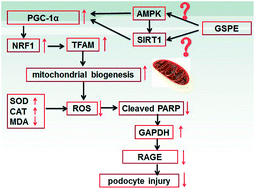Grape seed proanthocyanidin extracts ameliorate podocyte injury by activating peroxisome proliferator-activated receptor-γ coactivator 1α in low-dose streptozotocin-and high-carbohydrate/high-fat diet-induced diabetic rats
Abstract
Podocytes are part of the glomerular filtration membrane in kidney and serve to prevent the filtration of protein from the blood. Several evidences suggest that mitochondrial dysfunction plays a critical role in the pathogenesis of diabetic nephropathy and it is an early event in podocyte injury. Mitochondrial dysfunction promotes oxidative stress that can favor the development of podocyte injury. Peroxisome proliferator-activated receptor-γ coactivator 1α (PGC-1α) was considered to be a major regulator of metabolic homeostasis and mitochondrial function. Some studies indicated that polyphenols may improve mitochondrial dysfunction, maintain the podocyte integrity and have therapeutic effects on glomerular diseases by promoting PGC-1α expression. Our study investigated whether grape seed proanthocyanidin extracts (GSPE), a strong antioxidant, ameliorate podocyte injury by activating PGC-1α in low-dose streptozotocin-and high-carbohydrate/high-fat diet-induced diabetic rats. After 16 weeks of GSPE treatment, GSPE slightly increased the body weight and decreased plasma glucose, food intake, water intake and urine volume in diabetic rats. Further, GSPE significantly decreased 24 h albumin levels and increased the expression of nephrin and podocalyxin. The antioxidant levels were improved and the cellular damage of kidney in diabetic rats was also relieved effectively after the treatment. Moreover, GSPE increased the mRNA expression of mitochondrial biogenesis factors and mitochondrial DNA content. Finally, GSPE activated the expression of PGC-1α, silent mating type information regulation 2 homolog 1 (SIRT1) and AMP-activated protein kinase (AMPK). These results suggest that GSPE ameliorate podocyte injury in diabetic nephropathy by the activation of AMPK-SIRT1-PGC-1α signalling, which appears to inhibit oxidative stress and mitochondrial dysfunction in the kidney.


 Please wait while we load your content...
Please wait while we load your content...